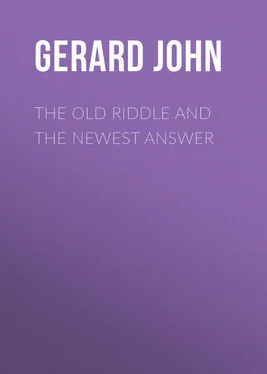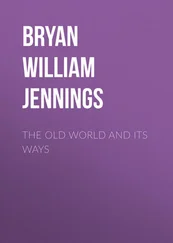John Gerard - The Old Riddle and the Newest Answer
Здесь есть возможность читать онлайн «John Gerard - The Old Riddle and the Newest Answer» — ознакомительный отрывок электронной книги совершенно бесплатно, а после прочтения отрывка купить полную версию. В некоторых случаях можно слушать аудио, скачать через торрент в формате fb2 и присутствует краткое содержание. Жанр: foreign_religion, foreign_antique, foreign_prose, на английском языке. Описание произведения, (предисловие) а так же отзывы посетителей доступны на портале библиотеки ЛибКат.
- Название:The Old Riddle and the Newest Answer
- Автор:
- Жанр:
- Год:неизвестен
- ISBN:нет данных
- Рейтинг книги:4 / 5. Голосов: 1
-
Избранное:Добавить в избранное
- Отзывы:
-
Ваша оценка:
- 80
- 1
- 2
- 3
- 4
- 5
The Old Riddle and the Newest Answer: краткое содержание, описание и аннотация
Предлагаем к чтению аннотацию, описание, краткое содержание или предисловие (зависит от того, что написал сам автор книги «The Old Riddle and the Newest Answer»). Если вы не нашли необходимую информацию о книге — напишите в комментариях, мы постараемся отыскать её.
The Old Riddle and the Newest Answer — читать онлайн ознакомительный отрывок
Ниже представлен текст книги, разбитый по страницам. Система сохранения места последней прочитанной страницы, позволяет с удобством читать онлайн бесплатно книгу «The Old Riddle and the Newest Answer», без необходимости каждый раз заново искать на чём Вы остановились. Поставьте закладку, и сможете в любой момент перейти на страницу, на которой закончили чтение.
Интервал:
Закладка:
VIII
MATTER AND MOTION
IN the forefront of the problems which have been pronounced to be not only unsolved but insoluble, are the nature and origin of the ultimate factors arrived at by Science in her study of the constitution of the universe, – Matter, Force, and Motion.
With the first and last of these alone need we at present concern ourselves, for "Force," as Science knows it, is always associated with Matter, and signifies no more in her terminology than that which produces, or tends to produce Motion. On the other hand, we are told, 48 48 Samuel Laing, Modern Science and Modern Thought , Cheap Edition, p. 19.
that "The contents of the material universe may be expressed in terms of Matter and Motion."
By "Matter" is understood "Sensible Substance," the stuff composing all of which our senses tell us, and which forms the object of Scientific investigation. What do we know concerning this raw material whereof worlds are made?
As we have seen, Professor Haeckel and his school are ready to tell us. Matter, we are assured, 49 49 Riddle of the Universe , p. 86.
is self-existent and imperishable, "it has no beginning and no end; it is eternity." Together with Ether, it occupies infinite and boundless space. It is in ceaseless motion; and its interminable modifications produce everything that ever was or ever will be. Movement 50 50 Ibid.
is one of the "innate and original properties" of Matter. So are Sensation and Will, 51 51 P. 78.
but these, we are warned, 52 52 P. 64.
are "unconscious."
Obviously, however, it is not enough that these things should be said, they require likewise to be proved; and the question must immediately suggest itself, Whence is proof to come? Not, by any possibility, from observation and experiment. For who can speak, of his own knowledge, to eternity or infinity? The only conceivable supposition is that Science has so thoroughly mastered the nature and properties of Matter here and now, as to be furnished with evidence unmistakably pointing to the above conclusions. Thus alone can she be quoted on their behalf; and it must always be remembered that the philosophy which we are examining is nothing if not scientific.
But, in the first place, is it quite clear of what our philosophers are speaking? They use the term "Matter" as though it represented some one definite thing: but this is very far from being the case.
We must remember [says Lord Grimthorpe] 53 53 Origin of the Laws of Nature , p. 23.
that matter is not an unit, as a creator is, and that talking of it so is merely a rhetorical artifice when used in philosophical inquiries… Matter is nothing but the sum of all the ultimate particles or atoms contained in the universe, or in any particular mass that we are dealing with… A very large proportion of the atoms of the universe have never been within millions and billions of miles of each other.
Therefore, he goes on to urge, the doctrine of the self-existence of Matter, must mean that each several atom is self-existent, or "every atom its own god." How comes it then that they all obey the same "Laws"? How have their various provinces been allotted? Above all, how are they not all the same, but – so far as we know – divided into classes widely different from one another? For, according to our present knowledge, – and we cannot too frequently remind ourselves that upon this alone can any sound conclusion be based, – there are, in round numbers, some seventy different species of atoms, whose diverse qualities are absolutely necessary for the production of the world. Had all atoms been of one kind, we could have had none even of what used to be called the Four Elements, – neither Earth, Air, Fire, nor Water.
But, – apart from this, – What is known concerning this same "Matter"? Has Science so thoroughly fathomed its constitution as to be able to declare that it possesses all the properties we have heard assigned to it, – Sensation and Will, even of the unconscious kind, whatever that may be, – locomotive power, – eternity, – and, in its collective capacity, immensity?
So far from this being the case, scientific men who were most willing, and even anxious, to assign to Matter a foremost, if not the foremost, place in Nature, have done so precisely upon the ground, not of our knowledge, but of our ignorance. No better examples need be sought than Professor Huxley, and Professor Tyndall, who alike agreed, in the words of the latter, 54 54 Belfast Address , 1874.
"to discern in Matter the promise and potency of every form and quality of life." But Huxley took his stand on the declaration, that we know so little about Matter as to make it impossible to say of what it may not be capable, for we cannot so much as be certain of its existence, and use the term only "for the unknown and hypothetical causes of our own states of consciousness," 55 55 Lay Sermons. "On the Physical Basis of Life," p. 143.
while Tyndall described the process, whereby the promise and potency are realized, as "the manifestation of a Power absolutely inscrutable to the intellect of man."
Speculations thus founded upon the absence of evidence, whatever else they may be, are certainly no part of Science; and when we turn to what, being established by scientific methods, is a possible basis of scientific argument, we find that in every instance it contradicts instead of supporting the assertions we have heard.
To begin with the question of Motion, as being both of supreme importance, and one more open than some others to observation and experiment. According to Professor Haeckel's teaching, "movement is an innate and original property of substance," that is to say of Matter, and in consequence, "Substance is everywhere and always in uninterrupted movement and transformation." It is by thus attributing to matter an inherent determination to move that he meets Du Bois-Reymond's difficulty as to the origin of motion.
But this is in direct opposition to the first of Newton's Laws, which are universally recognized as the most firmly established and unquestionable of all scientific conclusions. This law tells us that a body at rest will continue at rest for ever, unless compelled by some force to move; just as a body in motion will continue to move at the same rate and in the same direction, unless compelled by force to arrest or alter its course. Upon the universal certainty of this law the whole of our Natural Philosophy depends: but it absolutely blocks the way for the idea that Matter has an innate tendency to move itself, which is thus quite unscientific. Not self-movement but Inertia is the property which Science ascribes to Matter. 56 56 Professor Tait, Properties of Matter , § 108.
It may further be observed that the idea of inherent motion is absurd and unintelligible; for movement cannot be in more than one direction at a time: so that a mass, or an atom, of Matter could tend to move only by having an intrinsic impulse in a straight line towards some one particular point. If it should tend to move indifferently, in all directions at once, it would remain motionless, each such tendency being neutralized by its opposite.
As to the further claim made on behalf of Matter to be endowed with Sensation and Will, of any description, it must be enough to say that no one has ever pretended to find any evidence whatever to this effect, or to detect the faintest trace of such properties; – and that on the contrary, all experience shows inorganic Matter, (that is, Matter not incorporated in living animals or plants,) to be utterly lifeless and inert. It is a mere abuse and perversion of terms to speak of Science as countenancing any conclusion but that to which such experience points. The attempt to invest Matter with these attributes Professor Tait stigmatizes as "non-science," or "pseudo-science." 57 57 Contemporary Review , January, 1878, p. 301.
Интервал:
Закладка:
Похожие книги на «The Old Riddle and the Newest Answer»
Представляем Вашему вниманию похожие книги на «The Old Riddle and the Newest Answer» списком для выбора. Мы отобрали схожую по названию и смыслу литературу в надежде предоставить читателям больше вариантов отыскать новые, интересные, ещё непрочитанные произведения.
Обсуждение, отзывы о книге «The Old Riddle and the Newest Answer» и просто собственные мнения читателей. Оставьте ваши комментарии, напишите, что Вы думаете о произведении, его смысле или главных героях. Укажите что конкретно понравилось, а что нет, и почему Вы так считаете.












